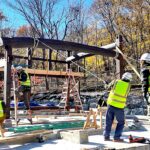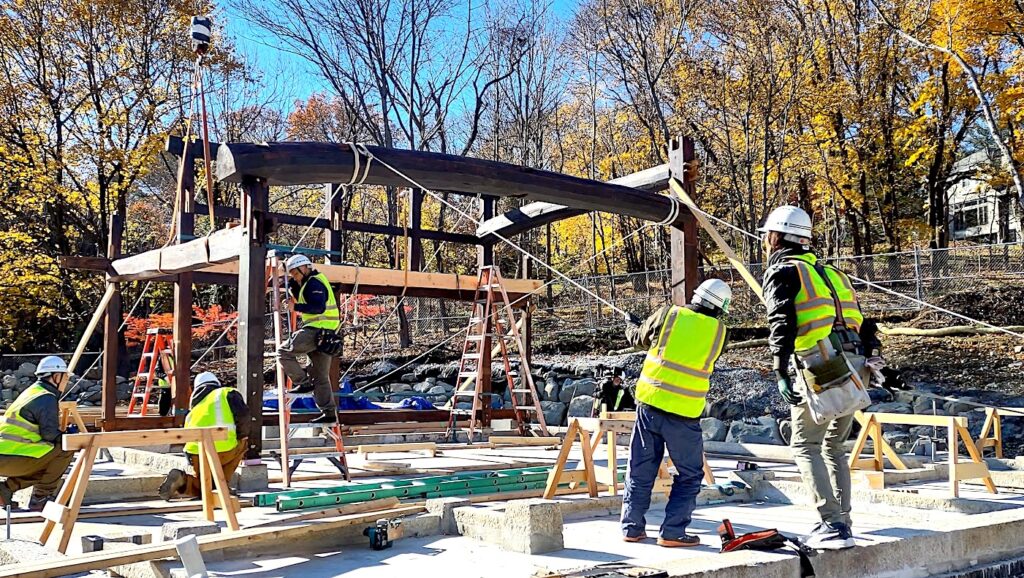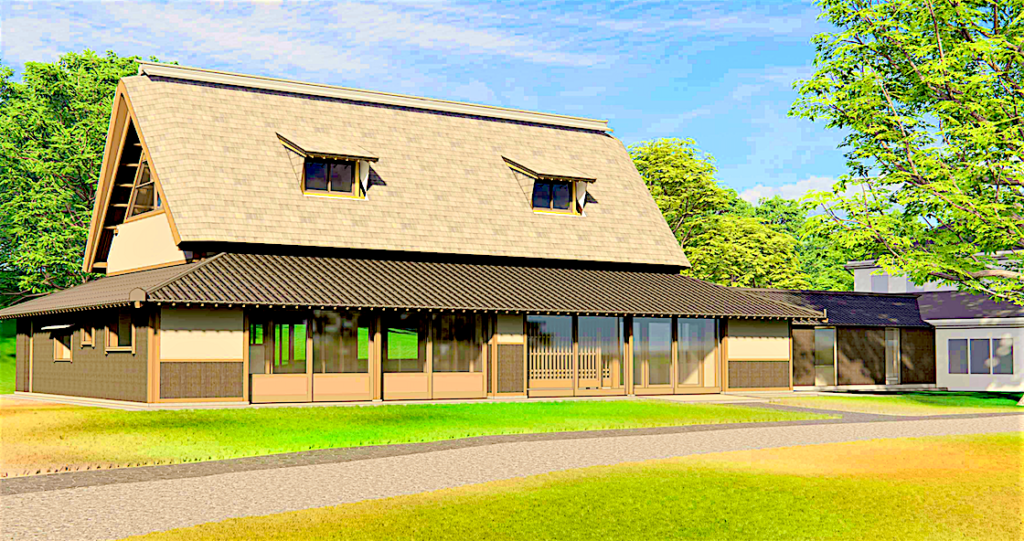
By Fred Bouchard
Drive up Concord Avenue from Belmont Center this winter, glance left after the big curve, and you’ll see an eye-catching sight behind the driveway opposite Sumner Lane; cherry trees and rhododendrons, a garden, and—rising behind the house—a half-built, huge-timbered barn. What, a barnraising on Belmont Hill?
This property belonged to the late Anne Allen and now bears a conservation restriction encompassing 3.3 acres of forest, fields, and meadows. Allen donated this property’s conservation restriction and the Maple Allee conservation restriction across the street to Belmont in 2004. These two conservation restrictions contribute to the town’s open spaces in order to sustain wildlife and natural habitats. See Belmontlandtrust.org for more information.
The Allen estate sold the property—with the conservation restriction on part of the site—to Miho Belmont International in 2015, a nonprofit organization promoting traditional Japanese arts and aesthetics and the spiritual and environmental values of Shumei philosophy. Shumei fosters health, happiness, and harmony among people of all denominations by applying the wisdom and insights of its spiritual leader, Mokichi Okada (1882–1955), or “Meishusama.” Meishusama taught that a world free of sickness, poverty, and discord is within everyone’s reach through the spiritual healing of jyorei, the practice of natural agriculture, flower arranging, and the appreciation of art and beauty.
Peter Grilli was named as director of the Belmont property. Raised in Japan, Grilli is a Harvard alumnus and president emeritus (2000–2014) of the Japan Society of Boston. Grilli’s ambitious and caring vision for the property focuses on founding a cultural center to be housed in a traditional Japanese farmhouse or minka. He’d already worked out relocation plans with Enishi Construction Company, and by 2018 had employed gardener Kenji Ban to plant 10 twice-blooming Japanese cherry trees and cultivate a quarter-acre vegetable garden.
Today Kenji Ban and his family live in the neo-Georgian home; his son and daughter attend Belmont public schools. His garden thrives with yellow marigolds, tall pink-tipped pea vines, potatoes, greens, daikon, and cucumbers. He and his wife have hosted the visiting team of eight Japanese carpenters engaged to reconstruct the minka. They disassembled the 250-year-old building in Japan—many main beams are 30-foot, slightly curved trunks of zelkova trees—and orchestrated its massive shipping. They are reassembling it on a part of the property that is not subject to the conservation restriction.
In November, the carpenters were painstakingly aligning dozens of 8-by-60 inch rectangular granite foundation supports along the edge of the poured cement substructure. By Thanksgiving, the mighty brown beams had risen impressively. A formal, celebratory roof-raising ceremony was held in December. In the spring, work will resume in the meticulous task of crafting the interior in pine and cedar, free of any nails or metal joinery. An arcaded breezeway will link the minka to the house. The greenhouse once tended by the Belmont Garden Club is expected to be refurbished.
The opening is expected in late 2024 as a 50- to 60- seat cultural center offering activities such as cooking demonstrations, origami classes, tea ceremonies, and intimate concerts played on traditional instruments like the koto, shamisen, and shakuhachi.
The calm, thoughtful Grilli says, “I feel very lucky that my lifelong dream is becoming reality.” Addressing the audience at the joto-sai, he said: “Much of what I learned in Japan—arts, architecture, material culture, social values and family relationships, design and proportion, and the like—came from sitting in traditional buildings like this. They are like silent universities, eloquent in conveying the deep truths about traditional Japanese life and culture.”
Many of us attending the ceremony under that robust and majestic yet intimate and sacred shell shared Grilli’s feelings of gratitude, inclusion, generosity, and gave thanks for the continued forging of Japanese-American unity.
Fred Bouchard is a member of the BCF Newsletter Committee and is a Belmont resident.




Sorry, the comment form is closed at this time.